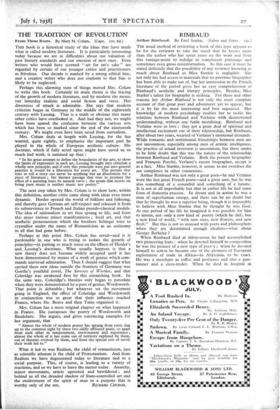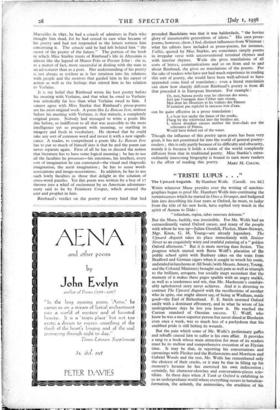RIMBAUD
Arthur Rimbaud. By Enid Starkie. (Faber and Faber. Iss.)
THE usual method of reviewing a book of this type appears to be for the reviewer to take the stand that he knows more than the author who has spent years on the work and from this vantage-point to indulge in complacent patronage and sometimes even gross misinformation. In this case it must be stated definitely that the possibility of any reviewer knowing as much about Rimbaud as Miss Starkie is negligible. She not only has had access to materials that no previous biographer has been able to make use of, but her immersion in the French literature of the period gives her an easy comprehension of Rimbaud's aesthetic and literary principles. Besides, Miss Starkie's talent for biography is striking. For these and other reasons her Arthur Rimbaud is not only the most complete account of that great poet and adventurer yet to appear, but it is by far the most interesting and best organised. Her knowledge of modem psychology enables her to tackle the relations between Rimbaud and Verlaine with disinterested understanding, without any futile moralising. Rimbaud and Verlaine were in love ; they got a great deal of spiritual and intellectual excitement out of their relationship, but Rimbaud, after about two years, wearied of Verlaine's emotional demands. While romantic and sentimental friendships between men are not uncommon, especially among men of artistic intelligence, the practice of sexual inversion is uncommon, but there seems to be little doubt that this was the nature of the relationship between Rimbaud and Verlaine. Both the present biographer and Francois Porche, Verlaine's recent biographer, accept it as a fact. Miss Starkie, however, it seems to me overdoes the sex complexes in other connexions.
Arthur Rimbaud was not only a great poet—he and Verlaine were the last great French poets—and a great seer, but he was also something of a scoundrel and something of a lunatic. It is not at all improbable but that in earlier life he had some form of dementia praecox. In dream and in action he was a man of superhuman energy, and there can be no doubt but that he thought he was a superior being, though it is impossible to believe with Miss Starkie that he thought he was God. At one period of his life he imagined it was possible for him to invent, not only a new kind of poetry (which he did), but a new kind of world, " With new stars, new flowers, and new flesh." But this is not so unusual with poets and philosophers when they axe determined enough idealists—what about George Berkeley ?
When Rimbaud died at thirty-seven he had accomplished two pioneering feats : when he devoted himself to composition he was the pioneer of a new type of poct :y ; when he devoted himself to action he became one of the pioneers of European exploitation of trade in Africa—in Abyssinia, to be exact. He was a merchant in coffee and perfumes and also a gun- runner and a slave-trader. When he died in hospital in
Marseilles in 1891, he had a amide of admirers in Paris who thought him dead, for he had ceased to care what became of his poetry and had not responded to the letters written him concerning it. The cenacle said he had left behind him " the secret of the poetry of the future." The portion of the book in which Miss Starkie treats of Rimbaud's life in Abyssinia is almost like the legend of Marco Polo or Prester John : she is, as a matter of fact, more successful in dealing with the man as an adventurer than as a poet. Her understanding of his poetry is `not always as evident as is her intuition into his relations with people and the motives that guided him in his career of action as well as the feelings that stirred him in his relation to Verlaine.
It is my belief that Rimbaud wrote his best poetry before his meeting with Verlaine, and that what he owed to Verlaine was, artistically far less than what Verlaine owed to him. I cannot agree with Miss Starkie that Rimbaud's prose-poems are his most original work. A poem like Le Bateau lyre, written before his meeting with Verlaine, is that miracle, a completely original poem. Nobody had managed to write a poem like this before, so indifferent to all that was accessible to the mere intelligence yet so pregnant with meaning, so startling in imagery and fresh in vocabulary. He showed that he could take any sort of common word and invest it with a new signifi- cance. A reader, to comprehend a poem like Le Bateau lyre has to put so much of himself into it that he and the poem can never separate again. First of all he has to discard the notion that literature has to have some logical meaning ; he has to use all: the faculties he possesses—his emotions, his intellect, every sort of imagination he can command—the visual and rhapsodic imagination, the aural imagination ; he has to sense word- associations and image-associations. In addition, he has to use such lowly faculties as those that delight in the solution of cross-word puzzles. Yet this poem was written by a boy of 17 thrown into a whirl of excitement by an American adventure- story said to be by Fenimore Cooper, which aroused the seer and prophet in him.
Rimbaud's verdict on the poetry of every kind that had preceded Baudelaire was that it was balderdash, " the bovine
glory of innumerable generations of idiots." His own prose- poems, however, show, I feel, distinct influences from Whitman : what his editors have inclnded as prose-poems, for instance, Veillee, quoted by Miss- Starkie, are sometimes simply poems in irregular verse with unconventional terminal rhymes and with interior rhymes. Wnile she gives translations of all sorts of letters, conununications and so on from and to and about Rimbaud, she gives no translations of the poems. For the sake of readers who have not had much experience in reading this sort of poetry, she would have been well-advised to have appended some kind of translation ; even a literal translation can show how sharply different Rimbaud's poetry is from,
that preceded it in European literature. For example :
Or, moi, bateau perdu sous les cheveux des anses, Jete par l'ouragan dans l' ether sans oiseau Moi dont les Monitors et les voiliets des Hanses N'auraient pas repeche la carcasse ivre d'eau.
can be quite effective in a prose translation :
I, a boat lost under the lianas of the creeks, Flung by the whirlwind into the birdless air,
I, whose drunken carcass neither the iron-clads nor the schooners of Hansa, Would have fished out of the water.
. Though the influence of this poetry upon poets has been very great, it has not penetrated far into the world of general poetry- readers ; this is only partly because of its difficulty and obscurity, mainly it is because it holds a vision of the world completely different from that in traditional poetry. Miss Starkie's extra- ordinarily interesting biography is bound to turn more readers the effort of reading this poetry. MARY M. COLUM.



















































 Previous page
Previous page